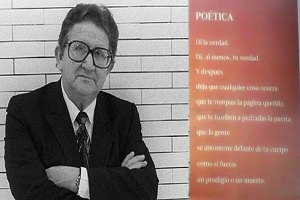
Havana, Cuba – If April was the cruelest month for the Anglo-American poet T.S. Eliot, for Cuban writers and artists it has always been a nightmare. Disqualifications, censorship, marginalization and prison for ideological, sexual and religious “deviations” turn the freedom of creation into a nightmare.
While the so-called “Words to the intellectuals” — Within the Revolution everything; against the Revolution, nothing — spoken by Fidel Castro signified a political corral for artistic and literary work in Cuba, the April diatribes transformed Cuban authors into docile sheep.
From the publication in Olive Green Magazine on 11 April 1965 of Ché’s book “Socialism in Cuba,” where he affirms that the “original sin” of the intellectuals was not having fought against Bastita, to the First Congress of Eduction and Culture, everything went from bad to worse.
With censorship of cultural projects, books, movies, “decadent” movies and works of dance and theater in place beforehand, the celebration of the Congress (23-30 April 1971) was a point of radicalization of the culture within the island, and a break with its followers abroad.
The Cuban Revolution, criticized by friends and enemies at the international level for imprisoning the poet Heberto Padilla, inaugurated during the Congress of policy of repression and intolerance that transcended the national atmosphere, and so as not to maintain the custom, established radical measures in April.
The celebration of a cultural exorcism or political farce staged in the midst of the Cuban Writers and Artists Union (UNEAC) so that Padilla (freed after 38 days in prison) would incriminate himself–in the best Soviet style–of being an enemy of the Revolution unleashed new criticisms in the final declaration and in Fidel’s speech.
The final declaration poured down like hot lead over the intellectuals present at the Congress, condemning all “forms of intellectualism, homosexuality and other social aberrations, any kind of religious practice, and affirms that art should be only at the service of the people.”
Moreover, in his closing speech Fidel railed against Western intellectuals (Sartre, Vargas Llosa, Rulfo, Cortázar, Moravia, Goytisolo, Octavio Paz, among others of the over thirty signatories of a letter published in Le Monde), and coined that “Art is a weapon of the Revolution.”
A year later came the parametración* which, born of the final declaration of the conference, dictated that “it is not permissible that through artistic quality homosexuals gain influence that affect the formation of our youth,” what was expressed legally and given criminal status in a Law.
More than three decades later, starting this coming Friday through Sunday, Cuba’s Palace of Conventions will host the victims and victimizers of a political culture subject to similar ideological and political bosses, who will make them cluck like broody hens the script written by power.
Tongues controlled and holding hands, many committed to the most despicable acts in the national culture, they will joing their voices in the VIII Congress of the UNEAC.
*Translator’s note: Parameterization/ parametración: From the word “parameters.” Parameterization is a process of establishing parameters and declaring anyone who falls outside them (the parametrados) to be what is commonly translated as “misfits” or “marginalized.” This is a process much harsher than implied by these terms in English. The process is akin to the McCarthy witch hunts and black lists and is used, for example, to purge the ranks of teachers, or even to imprison people.
Cubanet, 10 April 2014, Víctor Manuel Domínguez
vicmadomingues55@gmail.com
10 April 2014
